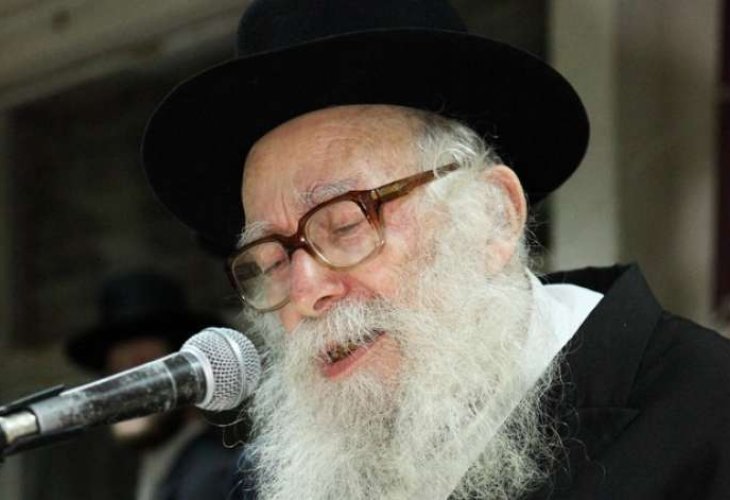Torah Personalities
Rabbi Nissim Karelitz: A Humble Giant of Jewish Law
Five years after his passing, the quiet brilliance of Rabbi Nissim Karelitz still shapes halachic (Jewish legal) rulings and inspires Jews around the world
 Rabbi Karelitz (Photo: Yaakov Nahumi, Flash 90)
Rabbi Karelitz (Photo: Yaakov Nahumi, Flash 90)A Life Dedicated to Torah and the Community
This Friday (the 23rd of the Jewish month of Tishrei) marks five years since the passing of Rabbi Nissim Karelitz, one of the most respected halachic (Jewish legal) authorities of the last generation. He served as the founder and head of the Beit Din Tzedek of Bnei Brak, widely known as the largest private rabbinical court in the world, and was a member of the Council of Torah Sages of Degel HaTorah, the head of the Chazon Ish Kollel, and the spiritual leader of the Ramat Aharon neighborhood in Bnei Brak.
Rabbi Karelitz was born in 1926 in Belarus. His mother was the sister of the Chazon Ish, and his family moved to the Land of Israel when he was ten years old to avoid enrolling him in a secular Polish school. He studied in the Ponevezh Yeshiva and quickly rose to prominence.
After his father passed away in 1959, Rabbi Karelitz assumed his roles as head of the Chazon Ish Kollel and rabbi of the Ligman Synagogue. In 1968, he established the Bnei Brak rabbinical court, which operated from his home and grew to include dozens of dayanim (rabbinical judges) in multiple panels. It handled cases of Jewish status, monetary disputes, giyur (conversion), and even communal concerns like cultural events, internet filtering, and etrog supervision. The court also oversaw a line of otzar beit din (distribution system of fruits grown in the sabbatical year) in accordance with the rulings of the Chazon Ish.
Rabbi Karelitz served as head of the rabbinical court until 2012, when his son-in-law Rabbi Sariel Rosenberg succeeded him. Rabbi Karelitz also sat on the rabbinical committee of Maayanei HaYeshua Medical Center, was appointed to the Vaad HaYeshivot, and eventually became its president alongside Rabbi Shmuel Wosner. In 1976, he became the spiritual leader of Ramat Aharon, and the following year joined the Council of Torah Sages. He played a key role in reuniting the political parties Degel HaTorah and Agudat Yisrael in 1992.
A Scholar of Few Words and Deep Wisdom
Rabbi Karelitz authored Shiurei HaRav Nissim, a work on the laws of tithes based on the Mishneh Torah of the Rambam (Maimonides), and the 13-volume Chut Shani series, which covers a wide range of halachic topics including Shabbat (4 volumes), family purity, the laws of interest, the sabbatical year, holidays, Pesach, Rosh Hashanah, Torah learning, and tefillin.
His personal conduct and halachic leadership reflected deep humility and complete dedication to the community. For many years, he refused to set formal visiting hours at his home so that people could ask questions at any time. Even after agreeing to set hours for health reasons, he insisted the door remain open to all. “My door is open all day,” he would say. When people pointed out that some came with non-urgent questions, he replied simply, “We have to be willing to suffer a little.”
In one case, after scheduling a late-night meeting with someone who failed to arrive, Rabbi Karelitz spent the night worrying that the person hadn’t been let in. “Is it possible someone was turned away from my house?” he asked his son the next morning.
Listening with Patience, Judging with Compassion
Rabbi Karelitz brought the same humility and sensitivity into his rabbinical court. He insisted that dayanim and litigants sit at the same table, not separate ones, so the claimants would feel heard and respected. His son-in-law described how Rabbi Karelitz believed this setup helped ensure litigants felt their voices mattered.
On one occasion, after a court case, he told his son that both sides had accepted the ruling without complaint, a rare outcome. “Usually, each party walks away feeling they were right, and they were especially noble for agreeing to the court's decision. But today, both parties accepted the verdict with full hearts,” he said. “Why? Because even though I knew early on how to rule, I let them speak for nearly three hours. They felt truly understood.”
Though often identified with the Haredi community, Rabbi Karelitz’s influence extended far beyond sectoral lines. A true Torah scholar radiates throughout the entire nation, denominations notwithstanding. His remarkable humility, quiet presence, and clarity in halacha were known from his youth. He rarely spoke of mundane matters, and when he did speak—whether in learning, in writing, or in judgment—it was brief, precise, and meaningful.
The Rambam’s words seem tailor-made to describe Rabbi Karelitz: “Just as a sage is distinguished by his wisdom and ideas, so too must he be distinguished in his actions and speech… Let a person always increase in silence and never speak except words of wisdom or those essential to physical well-being” (Hilchot De’ot 5:1–2).

